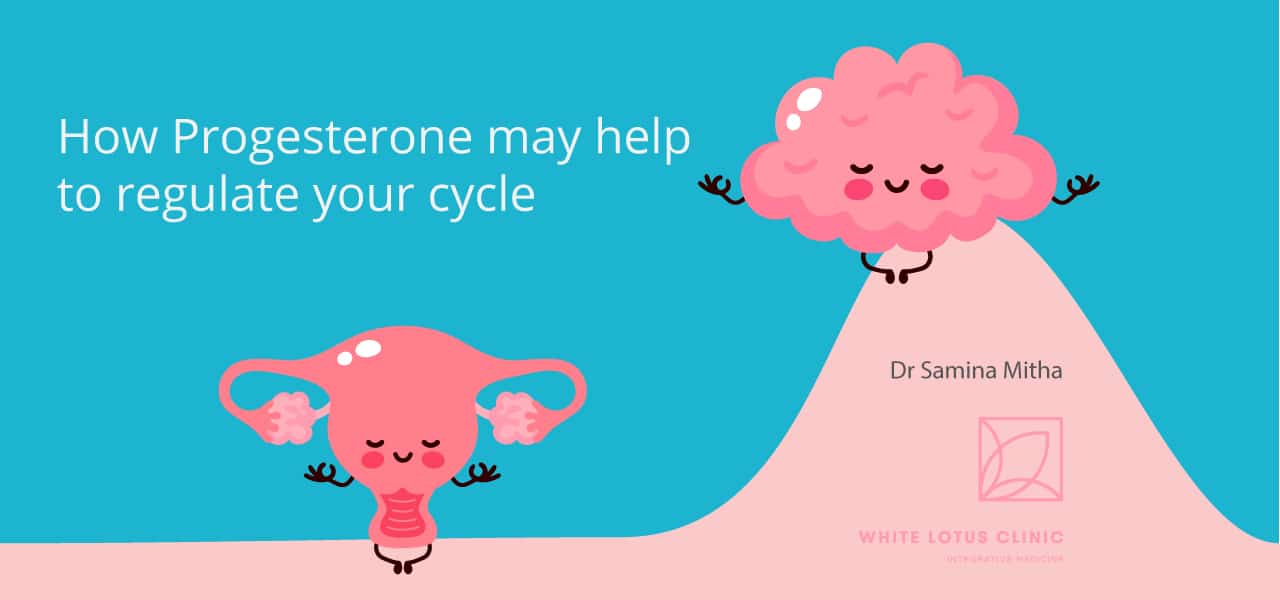How Progesterone may help to regulate your cycle
One of the common signs of PCOS is irregular periods. In fact, this irregularity is often the reason why many women seek medical guidance, and eventually end up getting diagnosed with PCOS. Let’s look into progesterone’s role in healthy, regular menstrual cycles.
Our periods are a sign of good health. Every month, the shedding of your uterine lining is a signal that your hormones are working in their cyclical nature.
In PCOS, it’s common to see irregular periods as soon as puberty commences. A woman will get her first period, then maybe a few months go by, and nothing arrives. She’s told this could be normal so she waits and waits. Then a year goes by and it seems odd. She’s then typically prescribed birth control pills to “regulate her cycles.”
The oral contraceptive pill (OCP) does not regulate periods, it does cause a bleed that may make you believe your period is so-called “regular”. However, the OCP is actually suppressing the connection between the brain and the ovaries. For some women, this can result in irregular cycles after coming off the pill.

So what is truly going on at puberty in women who are predisposed to PCOS?
Dr. Fiona explains this eloquently in her book, “8 Steps to Reverse Your PCOS.” She describes that during puberty, when female hormones are produced, Luteinizing Hormone (LH) is the primary hormone produced in the brain. As a girl starts to ovulate regularly, Follicle Stimulating Hormone (FSH) takes the lead and helps to produce estrogen—our primary female hormone—along with progesterone.
In PCOS, however, irregular ovulation or lack of ovulation results in a state where LH, testosterone and insulin resistance are predominant. Meanwhile, FSH, estrogen, and progesterone haven’t been able to establish their complete monthly rhythm.
Endocrinologist Dr. Jerilynn Prior suspects that gonadotrophin-releasing hormone (GnRH) is released from the brain too rapidly, which leads to too much LH. This in turn stimulates testosterone and estrogen production, which can interfere with ovulation and ultimately your menstrual cycle.
So how can we treat this rapid GnRH pulsing from the brain, bring down LH, testosterone and regain regular cycles?
The main treatment discussed by Dr. Jerilynn Prior and that we use is micronized progesterone (MP).
Micronized progesterone helps with the following:
1. Progesterone re-establishes the connection between the brain and the ovaries
This hormone can help to reduce the rapid pulsing of GnRH in the brain. Furthermore, it helps to reduce testosterone production from the ovaries. Progesterone may help to re-establish the natural rhythm of hormone production that is missing in PCOS. This treatment can help to ultimately regulate cycles in women with PCOS.
2. Progesterone opposes estrogen
It will oppose the higher estrogen levels produced in the ovaries even if you have no periods. Since this hormone opposes estrogen, it can help to reduce heavy periods, spotting, and fibrocystic breasts.
3. Progesterone Inhibits the enzyme 5-alpha reductase
Testosterone can get converted into a more potent type of testosterone known as dihydrotestosterone (DHT). This type can cause symptoms such as hair loss, excessive hair growth, and acne. Micronized progesterone may actually help to block the production of DHT.
What about the progesterone in the birth control, or medroxyprogesterone?

There are different types of progesterone. The type found in birth control is a synthetic form of known as progestin. It’s not exactly similar to the progesterone your body produces naturally.
Medroxyprogesterone is often prescribed to stimulate a period. However, this is also a progestin.
Micronized progesterone is a is a natural form of this hormone, which is considered bio-identical. This means that it’s identical to the progesterone produced naturally in your body.
What are the side effects of taking micronized progesterone?
It’s important to note that there are no serious side effects with micronized progesterone. That said, it can cause fatigue. It may also help to improve sleep, which can be an added bonus!
How long does it take to regulate cycles?
This depends largely on the patient, but you can expect it to start working anywhere from 3-12 months, depending on your case.
How can you start progesterone?
Micronized progesterone cannot be obtained over the counter—it’s by prescription only. Our naturopathic doctors are licensed in prescribing bio-identical hormones and can provide prescriptions.
Key Points
- In women with PCOS, hormonal imbalance can stem from puberty
- Progesterone can help to regulate cycles in women with PCOS
- This hormone can be prescribed by our doctors in the clinic
Next Steps
- If you’re suffering from irregular cycles, heavy periods, or endometriosis consider seeing one of our practitioners.
- To learn more about micronized progesterone therapy check out Dr. Jerilynn Prior’s website at https://www.cemcor.ubc.ca/
References
The Centre for Menstrual Cycle and Ovulation Research. (2020). Retrieved 20 July 2020, from http://cemcor.ubc.ca/




